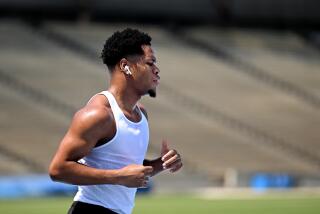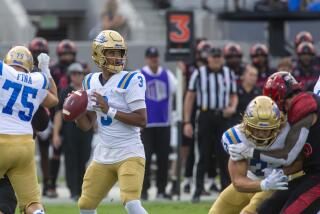BOXING / TIM KAWAKAMI : For Atlas, Title Shot Is Dad’s Payoff
- Share via
Teddy Atlas was wary late last year at the beginning of his relationship with Michael Moorer. “Give it two weeks, and walk away if things aren’t working,” he told himself.
Who needs the grief of trying to train a fighter best known for burning through trainers at mach speed?
“I wasn’t going to allow myself to be compromised,” Atlas says tightly.
Atlas is the man who, although he practically grew up with the young heavyweight and knew his vast potential, walked away from Mike Tyson when Tyson stopped listening, who left Cus D’Amato’s camp when D’Amato’s actions no longer seemed to match his principles.
Teddy Atlas training Michael Moorer? For John Davimos, Moorer’s manager, it was a match made in bull-headed heaven.
“I know Teddy, and I knew Teddy’s reputation,” Davimos said. “He put a gun to Tyson’s head (when Atlas thought Tyson was bothering the girlfriend of a friend). I was pretty sure if he was willing to do that, he’d actually shoot Michael.”
Davimos said that with a smile, now that Moorer’s title shot against heavyweight champion Evander Holyfield next Friday night at Caesars Palace is almost here, now that seven weeks of often tempestuous training seem to have invigorated both Moorer and Atlas as they approach the biggest fight of their lives.
“It just happened that the timing was pretty good,” Atlas says. “He wanted to be disciplined. He wanted it. It had to be somebody he believed, that really meant it, and he was going to test them. But he wanted to be, because I could not do it if he did not want to.
“It’s fortunate or unfortunate that it will all be weighed by whether he wins or loses. I know the reality of it, that’s winning and losing in life. But we have made progress.”
Moorer has something to prove--that he can approach a major bout mentally and physically stable. But Atlas has something to prove too.
“With Cus, if you didn’t have a strong personality, he’d overcome you and just leave you nothing but what he wanted to leave you with,” Atlas says. “And that didn’t happen with me.
“I kept what I thought was very valuable from Cus and I threw away what I thought was hogwash. I believed it was too one-dimensional. You don’t make everyone one way. You have to adapt to the time and place for the fighter.”
Does he think that Kevin Rooney, D’Amato’s disciple who took over Tyson’s training when Atlas left, has suffered from never expanding D’Amato’s teachings?
“Kevin wouldn’t be capable of it,” says Atlas, who has long feuded with Rooney. “Of course he could benefit, he’d be much more versatile.
Last year, Rooney lost Long Beach heavyweight Jeremy Williams when Williams thought Rooney was trying to force him into becoming a Tyson clone.
“Cus wasn’t pure, but at least he gave a much better appearance of it than Kevin does,” Atlas says. “Kevin, he just doesn’t do it as classy as Cus did, though Kevin thinks he does, I guess.
“Kevin does it Cus’ way because Kevin was one of those guys whose personality was overcome by Cus. The contradictory thing for me with Kevin is that he says all these things about Cus. Meanwhile, in certain areas of his life, he does the opposite thing of what Cus said he believed in, as far as his habits in front of the fighters, being an example.”
Atlas acknowledges a far stronger influence on his life than D’Amato’s.
“This is a funny way of putting it, but I learned more from my father, who was a doctor, about boxing, than from Cus’ bantering,” Atlas says of Theodore Atlas Sr. “Cus helped me formalize things in my mind, but my father made me understand what a pro was.
“He made me understand what tough was. He was always in pain, but he never missed a day of work, never made an excuse, didn’t come home until taking care of his obligations, his patients.”
During his seven-year, mostly unpaid apprenticeship with D’Amato, Atlas said, his father, who founded two hospitals in New Jersey, paid for his room and board, paid for equipment and never pushed him to give up the craziness for college.
“He passed away in November,” Atlas says. “He was 88. He was a very good man. So when you ask me what this means, that’s what this means. It means it validates in my own way, even though things shouldn’t have to be validated.
“I hope there’s a way people can see things, at least in my mind, that he could see, and just say, all those years he was supporting me, well, this is what it led to. This is the payoff.
“He didn’t get to go to a graduation for those seven years. This is the graduation.”
More to Read
Go beyond the scoreboard
Get the latest on L.A.'s teams in the daily Sports Report newsletter.
You may occasionally receive promotional content from the Los Angeles Times.










